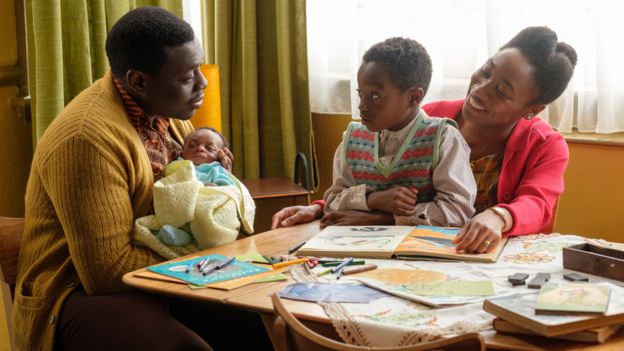Sickle cell: Call The Midwife shines spotlight on disease
By Shamaan Freeman-PowellBBC News
- 21 January 2019

Viewers and people with sickle cell disease have praised TV show Call The Midwife for its storyline portraying the condition.
In Sunday’s episode, which is set in 1964, characters Dr Turner and Nurse Trixie Franklin discover that a mysterious disease affecting a young Ghanaian family was a genetic blood disorder.
But it didn’t take long for viewers on social media to spot the symptoms and diagnose the condition as sickle cell.
Many took to social media to praise the period drama for its portrayal of the disease.

What is sickle cell?
Sickle cell is a life-long and serious inherited condition, which can only be passed on to a child if both parents are carriers – having what is called a “sickle cell trait”.
If both parents are affected, there is a 25% chance their child will have the condition.
According to the NHS, sickle cell disease is the most common serious inherited genetic disorder in England, affecting one in 2,000 births.
People with the disease produce unusually shaped red blood cells which don’t live as long as healthy blood cells, and so can become stuck in blood vessels.
It predominately – but not exclusively, affects people from African, Caribbean, Middle Eastern, Eastern Mediterranean and Asian backgrounds.
Nowadays, stem cell or bone marrow transplants can potentially cure sickle cell disease but the treatment itself comes with serious risk, so these are only used severe cases.
Painful episodes can sometimes be prevented by wrapping up warm and drinking plenty of fluid, and daily antibiotics can reduce risk of infections.
Generally, better awareness of the disease makes it easier to live with.
Nadine Eaton, head of blood donation campaigns for NHS Blood and Transplant, said: “People with sickle cell disease have a much better outlook than in the 1960s, including thanks to treatment with regular blood transfusions.
But she added: “We particularly need more black people to donate blood. Most sickle cell patients are black and donors from the same ethnic background are more likely to have matching blood.”

Sickle cell symptoms
Some people born with sickle cell disease experience problems from early childhood but many have few symptoms and lead normal lives.
When they occur, sickle cell episodes are very painful, can last for up to a week and are often referred to as a “crises”.
Those with the condition are at increased risk of serious infections.
They can also experience anaemia, which occurs when red blood cells can’t carry enough oxygen around the body – causing tiredness and shortness of breath.
In serious cases, people can experience delayed growth, strokes and lung problems.
‘I didn’t take it seriously’
The first Karl White, 65, heard about sickle cell was when his partner and eldest son were diagnosed with the trait more than 30 years ago.
Karl says at the time he didn’t think he needed to get tested.
“I refused at first. I said, ‘I haven’t got it,’ because I didn’t have any of the symptoms.”
It was when they were expecting their third, and what turned out to be their final child, that Karl went to get checked.
He was told he had the sickle cell trait, but says he still didn’t take the diagnosis seriously.
“When they told me I only had the trait I was kind of relieved but I was just thinking about myself.
“I didn’t realise how much it can affect your life until I saw what it did to my daughter.”
Karl’s daughter, Shareene, now 30, had her first crisis aged 10 and was admitted to hospital for pain relief.
She says her first crisis was painful – but it got worse as the years went on.

“When I was about 12, I was in the hospital all the time, like every other month.
“It was annoying, you want to be doing out doing fun stuff and you can’t.”
Shareene describes a crisis as: “Sometimes it can be a sharp pain that doesn’t go away, it just gets worse and worse and it can travel.
“It might start in my legs and can spread to my back and stomach and arms, until I feel it all over and it can last for a minimum of 24 hours, for me.
“Most of the time I deal with it at home. But the pain can get so bad I have to hospital to get morphine.”
Shareene says many of her teachers and school didn’t understand the condition, and she was criticised for not participating in activities like PE.
‘Get tested’
Dr Lola Oni, a specialist nurse consultant at Brent Sickle Cell and Thalassaemia Centre, contributed to the Call The Midwife script and said the episode was “brilliant”.
She says sickle cell is just as serious as cystic fibrosis and should be treated with the same caution – suggesting that, as with CF, people should get tested before starting a family.
“There is a lack of knowledge and they’re not aware of the genetic make up of the condition.”
While lots of people with sickle cell can maintain a healthy lifestyle, she it is still important to get tested.
‘Are you a carrier?’
Sickle cell carriers won’t develop sickle cell disease but are at risk of having a child with the condition if their partner is also a carrier.
You can request a blood test to check if you carry sickle cell from your GP or nearest sickle cell and thalassaemia centre.




Hello Nurse Audrey. I appreciate for this. But there’s bothering me. “My Eyes” the amount of fluid intake I undergo daily is high. But I still observe that my eyes colouration still remain the same. And when people see it they doubt me when I tell them I do drink water a lot. But the yellowish colour of the eye hadly changed thuo sometimes my urine is a little bit lighter, from my urine I can also tell that eye colouration is a bit clear. But still obvious that it is yellowish in colour.
But one thing I’ve also observed is that when i go to the hospital for fluid intake(Normal Saline) it helps to clear the eye. My eyes be much clearer than it was before the intravenous fluid intake. So am saying is that is it ok to go for it once in a month, is there no side effect to it. What do you think I can do? Thanks in anticipation to your favourable reply.
Yes, You can but its not advisable, increase your water intake…. drink like fish… the more you drink the clearer your eyes and forget what people will say,do you bits by drinking lots of water. And no am not a nurse, I am only a warrior, my eyes were like that at some point but gradually it is alot better as I drink water excessively. Stay woke on your health. We gon make it.
Kind Regards
Audrey Mukoro
Ok I’ve heard you. Thanks a lot. I’ll stick to the water therapy. But what do you use to measure your water intake. Can I see your water can. Thuo I’ve been drinking a lot of water lately. Today I observed that the colour of my urine was as close to being whitish in colour. And I urinated alot today. Frequent use of the toilet. Thank you.